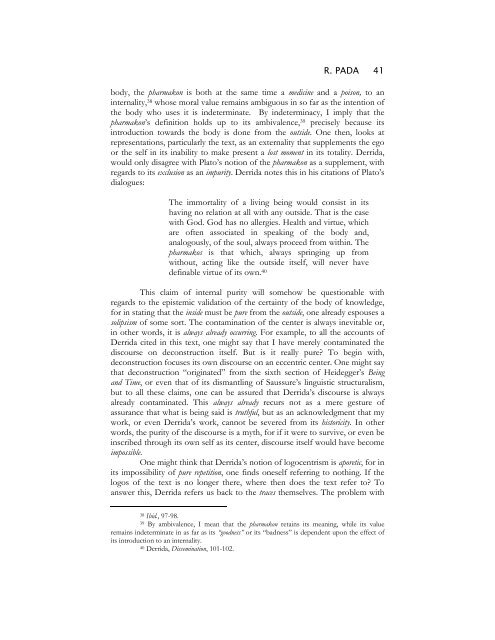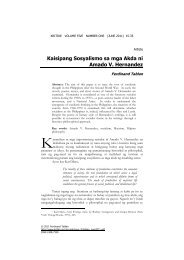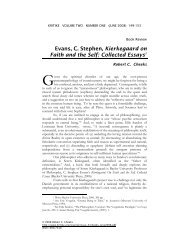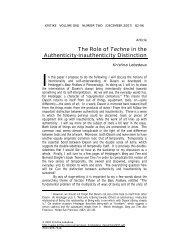The Paradox of Ipseity and Difference: Derrida's Deconstruction and ...
The Paradox of Ipseity and Difference: Derrida's Deconstruction and ...
The Paradox of Ipseity and Difference: Derrida's Deconstruction and ...
Create successful ePaper yourself
Turn your PDF publications into a flip-book with our unique Google optimized e-Paper software.
R. PADA 41<br />
body, the pharmakon is both at the same time a medicine <strong>and</strong> a poison, to an<br />
internality, 38 whose moral value remains ambiguous in so far as the intention <strong>of</strong><br />
the body who uses it is indeterminate. By indeterminacy, I imply that the<br />
pharmakon’s definition holds up to its ambivalence, 39 precisely because its<br />
introduction towards the body is done from the outside. One then, looks at<br />
representations, particularly the text, as an externality that supplements the ego<br />
or the self in its inability to make present a lost moment in its totality. Derrida,<br />
would only disagree with Plato’s notion <strong>of</strong> the pharmakon as a supplement, with<br />
regards to its exclusion as an impurity. Derrida notes this in his citations <strong>of</strong> Plato’s<br />
dialogues:<br />
<strong>The</strong> immortality <strong>of</strong> a living being would consist in its<br />
having no relation at all with any outside. That is the case<br />
with God. God has no allergies. Health <strong>and</strong> virtue, which<br />
are <strong>of</strong>ten associated in speaking <strong>of</strong> the body <strong>and</strong>,<br />
analogously, <strong>of</strong> the soul, always proceed from within. <strong>The</strong><br />
pharmakos is that which, always springing up from<br />
without, acting like the outside itself, will never have<br />
definable virtue <strong>of</strong> its own. 40<br />
This claim <strong>of</strong> internal purity will somehow be questionable with<br />
regards to the epistemic validation <strong>of</strong> the certainty <strong>of</strong> the body <strong>of</strong> knowledge,<br />
for in stating that the inside must be pure from the outside, one already espouses a<br />
solipsism <strong>of</strong> some sort. <strong>The</strong> contamination <strong>of</strong> the center is always inevitable or,<br />
in other words, it is always already occurring. For example, to all the accounts <strong>of</strong><br />
Derrida cited in this text, one might say that I have merely contaminated the<br />
discourse on deconstruction itself. But is it really pure? To begin with,<br />
deconstruction focuses its own discourse on an eccentric center. One might say<br />
that deconstruction “originated” from the sixth section <strong>of</strong> Heidegger’s Being<br />
<strong>and</strong> Time, or even that <strong>of</strong> its dismantling <strong>of</strong> Saussure’s linguistic structuralism,<br />
but to all these claims, one can be assured that Derrida’s discourse is always<br />
already contaminated. This always already recurs not as a mere gesture <strong>of</strong><br />
assurance that what is being said is truthful, but as an acknowledgment that my<br />
work, or even Derrida’s work, cannot be severed from its historicity. In other<br />
words, the purity <strong>of</strong> the discourse is a myth, for if it were to survive, or even be<br />
inscribed through its own self as its center, discourse itself would have become<br />
impossible.<br />
One might think that Derrida’s notion <strong>of</strong> logocentrism is aporetic, for in<br />
its impossibility <strong>of</strong> pure repetition, one finds oneself referring to nothing. If the<br />
logos <strong>of</strong> the text is no longer there, where then does the text refer to? To<br />
answer this, Derrida refers us back to the traces themselves. <strong>The</strong> problem with<br />
38 Ibid., 97-98.<br />
39 By ambivalence, I mean that the pharmakon retains its meaning, while its value<br />
remains indeterminate in as far as its “goodness” or its “badness” is dependent upon the effect <strong>of</strong><br />
its introduction to an internality.<br />
40 Derrida, Dissemination, 101-102.
















